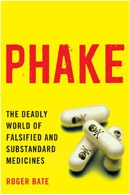Phake: shining a light on substandard and falsified medicines
Phil Taylor, 13-Apr-2012
 Many of our regular readers will be
aware of the work of Roger Bate of the American Enterprise
Institute, who has been at the forefront of an effort to provide
empirical data on falsified and substandard medicines through
fieldwork, sampling and testing of medicinal products around the
world.
Many of our regular readers will be
aware of the work of Roger Bate of the American Enterprise
Institute, who has been at the forefront of an effort to provide
empirical data on falsified and substandard medicines through
fieldwork, sampling and testing of medicinal products around the
world.
Some of you may also have read Bate's excellent book Making a
Killing, which was published in 2008 and was one of the first
volumes to provide a comprehensive look at the international
counterfeit drug trade.
Bate has now written a new book - entitled Phake: The
Deadly World of Falsified and Substandard Medicines -
which draws together his experience and study data generated over
the last few years and presents what is probably the most reliable
and informed assessment yet of drug quality worldwide.
The findings make for thrilling but grim reading. After sampling
thousands of drugs from 17 countries, Bate concludes that around 12
per cent of medicines will not work as expected because they failed
quality tests and were substandard, degraded or counterfeit.
The data "paint a picture of a world beset by inconsistent drug
quality", with the scale of the problem generally inversely
proportional to the affluence of the country.
Almost half (46 per cent) of the drugs that failed quality tests
were likely to be counterfeit as they had no detectable active
pharmaceutical ingredient (API), but a proportion of those deemed
to be fake contained API that was probably added to fool basic
identity testing.
All told, Bate estimates that the death toll that can be attributed
to counterfeit medicines is more than 100,000 people a year.
Phake delivers a fascinating first-hand account of the counterfeit
drug trade whilst also providing policy analysis and
recommendations that could make the supply of medicines more
reliable and safe.
Among the measures proposed is the introduction of an international
treaty penalising counterfeits, tracing drug components'
geographical origin, improving intellectual property protection,
and deploying innovative technology, such as the use of codes on
medicine packs to allow consumers to authenticate their medicines
using mobile phones.
The book concludes with a plea for stronger and more cooperative
action against dangerous drugs, in light of "extreme positions from
both industry and health activists and similarly extreme positions
of antagonistic countries".
Along with Mark Davison's recently published
Pharmaceutical Anti-counterfeiting, Phake is a must-have
addition to the bookshelf of anyone working in the area of medicine
counterfeiting and supply chain security. Highly recommended.

©
SecuringIndustry.com




 Many of our regular readers will be
aware of the work of Roger Bate of the American Enterprise
Institute, who has been at the forefront of an effort to provide
empirical data on falsified and substandard medicines through
fieldwork, sampling and testing of medicinal products around the
world.
Many of our regular readers will be
aware of the work of Roger Bate of the American Enterprise
Institute, who has been at the forefront of an effort to provide
empirical data on falsified and substandard medicines through
fieldwork, sampling and testing of medicinal products around the
world.